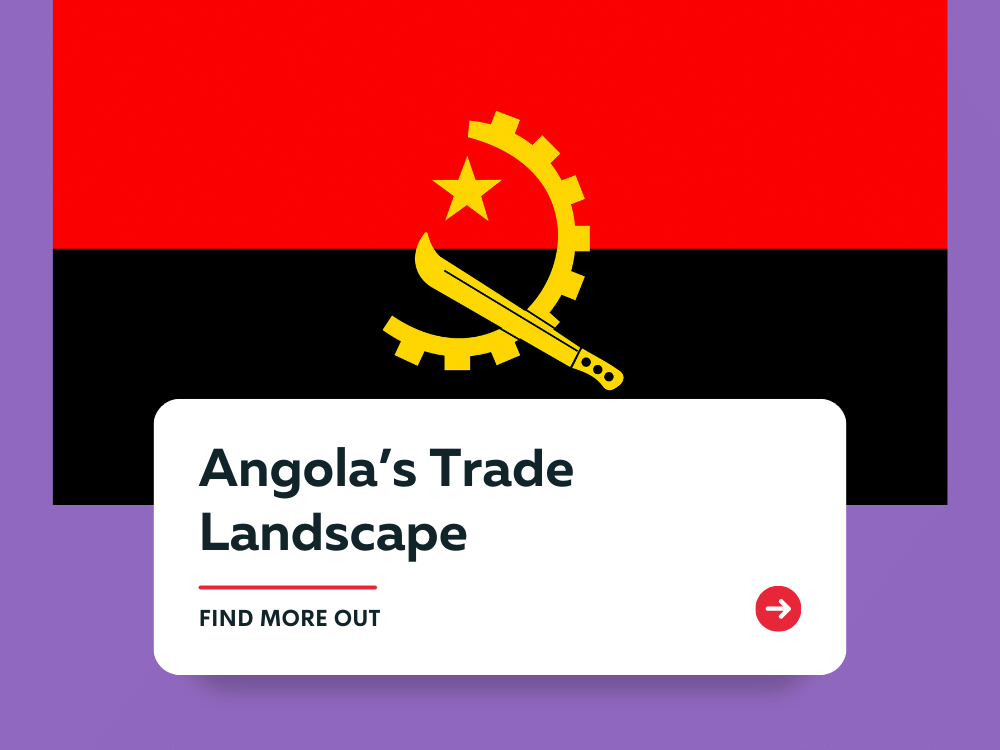
What are the Top 5 Most Imported Items in Angola?
Angola, an emerging economy in Southern Africa, shows a diverse range of imports. These imports play a crucial role in supporting the country’s development and meeting the needs of its population. Let’s explore the top five items that Angola imported in 2022.
- Mineral Fuels, Oils, Distillation Products ($3.98B): Leading the list, Angola imported mineral fuels, oils, and distillation products worth $3.98 billion in 2022. Despite being a significant oil producer, Angola relies on these imports to meet its domestic energy demands and industrial needs.
- Machinery, Nuclear Reactors, Boilers ($2.37B): With imports valued at $2.37 billion, machinery, including nuclear reactors and boilers, comes second. These imports are key to modernizing Angola’s infrastructure and industries, reflecting the country’s focus on industrial growth.
- Vehicles Other Than Railway, Tramway ($1.40B): Angola spent $1.40 billion on importing vehicles. This does not just include cars for personal use, but also commercial vehicles, which are essential for transportation and logistics in the country.
- Electrical, Electronic Equipment ($949.76M): The country’s investment in technology is evident with imports of electrical and electronic equipment amounting to $949.76 million. These items are vital for the development of Angola’s digital infrastructure and technological capabilities.
- Cereals ($827.89M): Finally, cereals, with imports worth $827.89 million, show Angola’s efforts to ensure food security. These imports are crucial in supplementing domestic agricultural production and maintaining stable food supplies.
Each of these imports plays a unique role in supporting Angola’s economy and development. From enhancing energy infrastructure to bolstering food security, these items are essential for Angola’s growth trajectory.
Biggest Exporters to Angola and Their Primary Export Items (2022)
| Country | Total Exports to Angola (USD) | Top Export Items & Value (2022) |
|---|---|---|
| China | $2.8 billion | Electrical, Electronic Equipment ($534.25M) |
| Vehicles, Other Than Railway, Tramway ($470.76M) | ||
| Machinery, Nuclear Reactors, Boilers ($464.94M) | ||
| Plastics ($249.04M) | ||
| Iron and Steel ($225.60M) | ||
| Portugal | $1.9 billion | Machinery, Nuclear Reactors, Boilers ($280.98M) |
| Electrical, Electronic Equipment ($154.15M) | ||
| Articles of Iron or Steel ($74.03M) | ||
| Animal, Vegetable Fats and Oils, Cleavage Products ($71.28M) | ||
| Pharmaceutical Products ($67.80M) | ||
| South Korea | $1.7 billion | Mineral Fuels, Oils, Distillation Products ($1.51B) |
| Plastics ($46.77M) | ||
| Vehicles, Other Than Railway, Tramway ($27.80M) | ||
| Machinery, Nuclear Reactors, Boilers ($25.04M) | ||
| Electrical, Electronic Equipment ($16.41M) | ||
| Netherlands | $1.2 billion | Mineral Fuels, Oils, Distillation Products ($1.13B) |
| Machinery, Nuclear Reactors, Boilers ($38.04M) | ||
| Meat and Edible Meat Offal ($23.67M) | ||
| Electrical, Electronic Equipment ($11.39M) | ||
| Vehicles, Other Than Railway, Tramway ($11.31M) | ||
| India | $1.1 billion | Mineral Fuels, Oils, Distillation Products ($312.00M) |
| Cereals ($249.05M) | ||
| Pharmaceutical Products ($162.94M) | ||
| Machinery, Nuclear Reactors, Boilers ($60.34M) | ||
| Plastics ($54.26M) |
This table reveals a fascinating snapshot of Angola’s trade relationships with its top five exporting countries in 2022. It’s evident that Angola’s imports are diverse, ranging from essential commodities like mineral fuels and oils to more specialized goods such as machinery and electronic equipment. China, as Angola’s top exporter, provides a wide range of goods, reflecting the depth of their trade relationship. Portugal and South Korea also play significant roles, with a focus on machinery and mineral products. The Netherlands and India contribute mainly in the areas of mineral fuels and pharmaceuticals.
Understanding these trade patterns is crucial for stakeholders in the logistics and cargo tracking industry. It provides insights into the types of goods moving into Angola, the complexity of managing such diverse imports, and the significance of maintaining efficient supply chains. As Angola continues to develop and diversify its economy, these trade relationships are likely to evolve, offering new opportunities and challenges in the international trade and cargo management sectors.
The Role of CNCA in Shaping Angola’s Trade Dynamics
As Angola forges its path as a significant player in Southern Africa’s trade landscape, the effectiveness of its import and export procedures is crucial. Central to this efficiency is the National Council of Shippers’ Agency (CNCA), a vital component in regulating maritime cargo entering Angola. The CNCA’s influence is instrumental in refining import and export processes.
Why is CNCA Essential for Angola’s Trade?
In Angola, where the economy is bolstered by imports such as mineral fuels, machinery, and vehicles, the CNCA is key to optimizing the import mechanism. It plays a significant role in pre-arrival cargo processing, minimizing port congestion, and curbing unlawful trade practices. Ensuring compliance with CNCA regulations is essential to avoid importation delays and potential penalties.
Advantages of CNCA for Importers and Exporters
- Streamlined Customs Clearance: CNCA certification expedites the customs clearance process, reducing the time cargo spends in ports and facilitating quicker market entry.
- Enhanced Cargo Tracking: The CNCA process offers a reliable method for monitoring cargo, improving the security and integrity of goods during transit.
- Guaranteed Regulatory Adherence: By complying with CNCA requirements, shipments conform to Angola’s import regulations, reducing the risk of legal complications.
- Predictability in Shipping Operations: With CNCA approval, businesses can more effectively plan their logistics, anticipating fewer delays related to customs.
Conclusion
In essence, Angola’s import and export sector, characterized by its variety and vitality, hinges significantly on appropriate regulatory compliance, with the CNCA playing a pivotal role. This agency is not merely a regulatory body but a strategic facilitator for smooth and effective trade. For entities engaged in maritime shipping to Angola, securing CNCA certification is a fundamental step towards ensuring successful and seamless trade operations.



